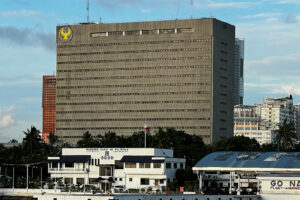




Philippines Trade Update: Imports weaken on tepid demand
 DOWNLOAD
DOWNLOAD

Policy Rate Updates: BSP outlook — cloudy with a chance of rate cut
 DOWNLOAD
DOWNLOAD

January Economic Update: Growth slows, prices rise
 DOWNLOAD
DOWNLOAD


BSP approves consumer redress standards for online transactions

The Bangko Sentral ng Pilipinas’ (BSP) policy-setting Monetary Board has approved consumer redress mechanism standards for electronic payments to ensure the timely resolution of issues encountered in the use of online transactions, such as failed fund transfers.
BSP Circular 1195 Series of 2024, dated June 1, said the standards will cover account-to-account electronic fund transfers under the National Retail Payment System framework.
“The use of electronic payments continues to expand and is expected to steadily grow. With the increased adoption of digital payment services, the Bangko Sentral recognizes the need to ensure that Bangko Sentral-Supervised Institutions (BSIs) that offer electronic fund transfers (EFTs) through their participation in the Automated Clearing House/s (ACH) provide appropriate and timely consumer recourse mechanisms on issues lodged by consumers,” the central bank said in the circular, which amends the Manual of Regulations for Payment Systems to add a section on end-user protection as well as a glossary of terms.
“Defined industry-wide actions and expectations on clearing switch operators (CSOs) and ACH participants for the timely resolution of consumer concerns relating to EFTs build trust and confidence in the use of digital payments,” the BSP said.
The consumer redress mechanism standards shall apply to all CSOs and ACH participants that provide domestic account-to-account electronic fund transfers, including person-to-person, person-to-merchant, and person-to-biller payments.
“This regulation does not cover dispute resolution involving the delivery of products and/or services underlying the payment transaction,” the BSP said.
The standards include guidelines on necessary notifications for real-time or batched electronic fund transfers, the return of funds, collection and return of electronic fund transfer fees, the disruption of services and operations, and consumer protection.
“For instant retail payments and corresponding use cases, the amount debited from the sender’s account shall be returned to the sender’s account within one (1) hour from receipt of sender instruction. This shall apply to rejected transactions, returned transactions, and timed-out transactions,” the BSP said.
“For batch clearing and settlement of electronic payments and corresponding use cases, the amount debited from the sender’s account shall be returned to the sender’s account within two (2) hours from receipt of settlement report from the CSO for rejected transactions and returned transactions,” it said.
The central bank noted, however, that these rules will not apply to unauthorized or erroneous transactions.
Meanwhile, for service disruptions, CSO and ACH participants must notify the BSP and consumers on the occurrence of scheduled and unscheduled downtime, which must include information and updates on the status, the reason for the issue, as well as the expected period for the resumption of service.
The central bank added that financial institutions have the “primary responsibility of communicating to the sender, as their own accountholders, the status and updates on investigations, and resolution of unauthorized and/or erroneous transactions” as part of its consumer protection standards.
“The ACH operating guidelines shall provide industry-level standards, procedures, and information sharing mechanism, as applicable, from relevant stakeholders, in handling possible root causes of unauthorized transactions (e.g., social engineering, phishing, among others),” it said.
All BSP-supervised firms covered by the circular must comply with its provisions by Dec. 31.
“The same period is afforded for the necessary coordination and/or approvals among the respective ACHs and/or the Philippine Payments Management. Inc., and the issuance of the revised ACH operating guidelines,” it added. — L.M.J.C. Jocson
This article originally appeared on bworldonline.com





 By BusinessWorld
By BusinessWorld